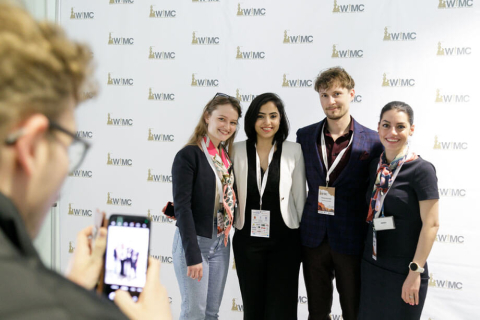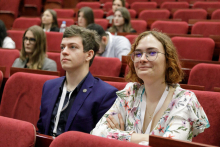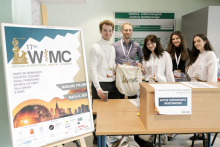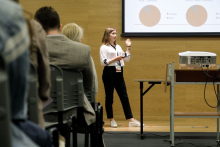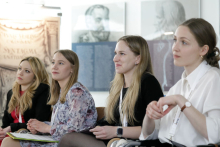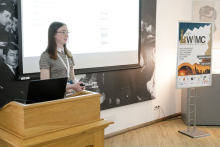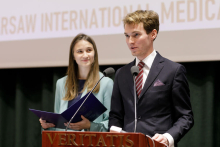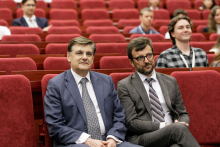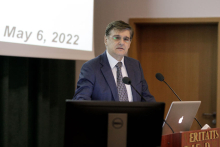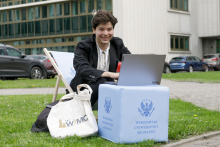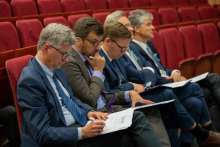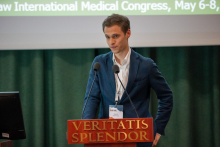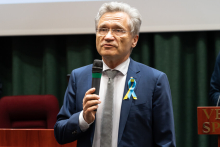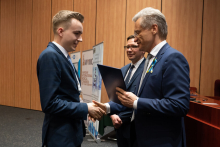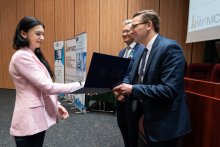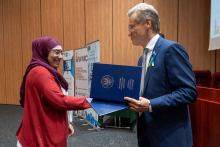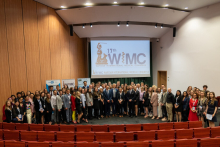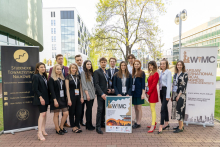During the three days of the event we hosted about 300 young scientists from different parts of the world. The congress was full of interesting sessions, more than 20 workshops were held, you could also listen to expert lectures.
- The Congress is a very important point in your academic career. Even if you are not thinking about being a researcher in the future, participating in scientific projects allows you to broaden your knowledge, acquire new skills and competencies. Most of all, though, it's a chance to build the contact networks that are so important in the medical profession. - said to the young scientists the Rector of our University - Prof. Zbigniew Gaciong, who officially opened the session. The opening ceremony was also attended by the Vice Rector for Student Affairs and Education - Professor Marek Kuch and the Vice Rector for International Relations, Development and Promotion - Professor Paweł Włodarski.
Contest presentations
On the first day of the conference, starting in the morning hours, participants presented their research findings in six thematic sessions, including neurology and neurosurgery, medical psychology and psychiatry, as well as cardiology and cardiac surgery. The works were evaluated by a jury composed of distinguished experts from Poland and abroad in the following categories: manner of presentation, content-related values, attractiveness of the topic, independence of the work. A total of 24 sessions were held over the three days of the congress in which over 200 participants presented their works (abstract book available here). In each session, prizes were awarded by the jury for the best presentation. The winners were announced during the closing ceremony of the Congress. The awards were presented by the Rector of the MUW - Prof. Zbigniew Gaciong and Prof. Michał Grąt - Director of the Doctoral School of the Medical University of Warsaw.
The list of winners is published here.
Workshops and expert lectures
WIMC participants could also benefit from a number of specialized workshops. Among them were a variety of topics such as surgical suturing, learning how to take bone marrow, otolaryngology exams, and eye exams. You could learn how to perform echocardiography, carotid artery ultrasound, or knee joint ultrasound. The workshops were organized by student scientific society operating at MUW.
An extremely important element of the congress are expert lectures that provide inspiration for further development to young scientists, as well as an opportunity to establish valuable contacts. This year the group of experts included: Prof. Mariusz Wąsik from Fox Chase Cancer Center in Philadelphia, Prof. Peter Minko from Heinrich-Heine-Universität in Düsseldorf and Paweł Sobczuk, MD, from the Department of Experimental and Clinical Physiology of the Medical University of Warsaw. Prof. Mariusz Wąsik gave two lectures: one - inaugural, on CAR-T immunotherapy and the other on neoplastic transformation of cells of the lymphoid system. Prof. Peter Minko discussed interventional pain therapy in osteoarthritis and tendinopathy. The last speaker, Paweł Sobczuk, MD, in his lecture tried to answer the question whether social media can be a new space for presenting science.
A chance to make contacts
- After 3 years, the Warsaw International Medical Congress is back in our University. We were pleased to be one of the first international conferences to be conducted entirely in an onsite format. The 3 days were filled with scientific sessions, practical workshops, expert lectures and, above all, opportunities to meet inspiring young science enthusiasts. I must admit that it was a challenge for us. We believe that organizing the event in this form will help promote scientific work among students. And we already invite you to the next edition next year - sums up the event Anna Krawczyk - the chairwoman of the Congress.
